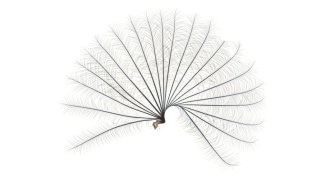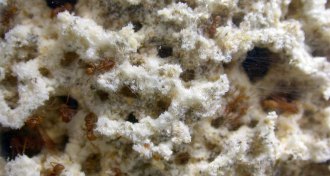Animals
-
 Animals
AnimalsHere’s why some water striders have fans on their legs
A fan of tiny, elegant plumes on their legs helps certain water striders dash across flowing water without getting wet.
By Susan Milius -
 Animals
AnimalsAlligators eat sharks — and a whole lot more
Alligators aren’t just freshwater creatures. They swim to salty waters and back, munching on plenty of foods along the way.
-
 Animals
AnimalsLeafhoppers use tiny light-absorbing balls to conceal their eggs
Leafhoppers produce microscopic balls that absorb light rather than reflect it and help camouflage the insects’ eggs.
-
 Animals
AnimalsNo more than 800 orangutans from this newly identified species remain
Endangered population of orangutans is the oldest surviving red ape lineage, a new study finds.
By Bruce Bower -
 Animals
AnimalsAnts were among the world’s first farmers
50 years ago, researchers began unraveling the secrets to Attine ants’ green thumbs.
-
 Earth
EarthDino-dooming asteroid impact created a chilling sulfur cloud
The Chicxulub impact spewed more sulfur than previously believed.
-
 Animals
AnimalsGreat praise for categories, and seeing beyond them
Acting Editor in Chief Elizabeth Quill discusses classification and some of the challenges of putting species in categorical boxes.
-
 Health & Medicine
Health & MedicineReaders intrigued by ancient animals’ bones
Readers had questions about gut bacteria, woolly rhino ribs and ancient horses hooves.
-
 Animals
AnimalsThis sea slug makes its prey do half the food catching
Nudibranchs’ stolen meals blur classic predator-prey levels.
By Susan Milius -
 Life
LifeHybrids reveal the barriers to successful mating between species
Scientists don’t understand the process of speciation, but hybrids can reveal the genes that keep species apart.
-
 Animals
AnimalsScary as they are, few vampires have a backbone
Researchers speculate on why there are so few vampires among vertebrates.
By Susan Milius -
 Animals
AnimalsHere’s the real story on jellyfish taking over the world
In 'Spineless,' a former marine scientist reconnects with the seas and science through her obsession with these enigmatic creatures.